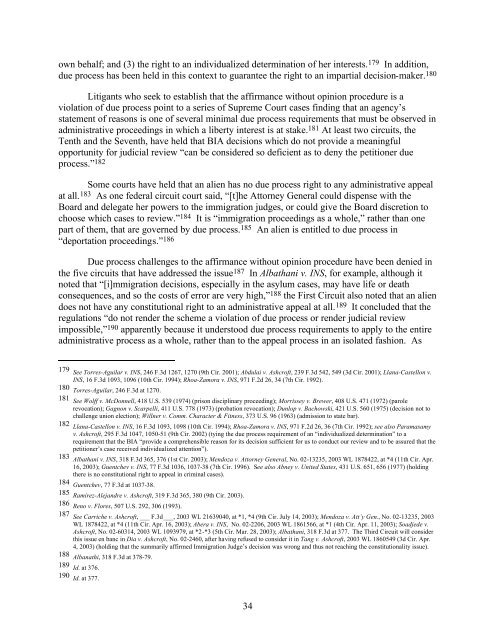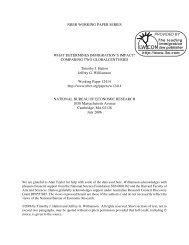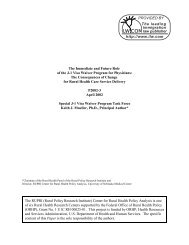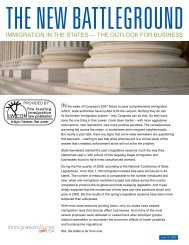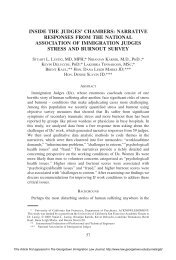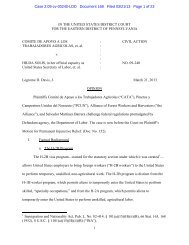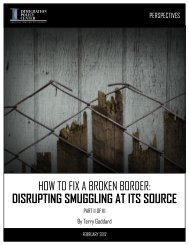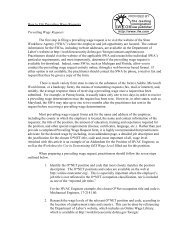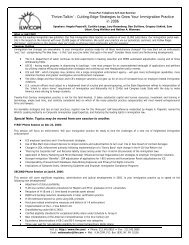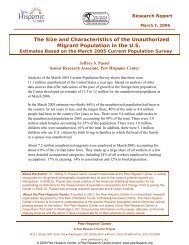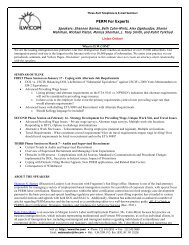Study of Board of Immigration Appeals Procedural Reforms - ILW.com
Study of Board of Immigration Appeals Procedural Reforms - ILW.com
Study of Board of Immigration Appeals Procedural Reforms - ILW.com
You also want an ePaper? Increase the reach of your titles
YUMPU automatically turns print PDFs into web optimized ePapers that Google loves.
own behalf; and (3) the right to an individualized determination <strong>of</strong> her interests. 179 In addition,<br />
due process has been held in this context to guarantee the right to an impartial decision-maker. 180<br />
Litigants who seek to establish that the affirmance without opinion procedure is a<br />
violation <strong>of</strong> due process point to a series <strong>of</strong> Supreme Court cases finding that an agency’s<br />
statement <strong>of</strong> reasons is one <strong>of</strong> several minimal due process requirements that must be observed in<br />
administrative proceedings in which a liberty interest is at stake. 181 At least two circuits, the<br />
Tenth and the Seventh, have held that BIA decisions which do not provide a meaningful<br />
opportunity for judicial review “can be considered so deficient as to deny the petitioner due<br />
process.” 182<br />
Some courts have held that an alien has no due process right to any administrative appeal<br />
at all. 183 As one federal circuit court said, “[t]he Attorney General could dispense with the<br />
<strong>Board</strong> and delegate her powers to the immigration judges, or could give the <strong>Board</strong> discretion to<br />
choose which cases to review.” 184 It is “immigration proceedings as a whole,” rather than one<br />
part <strong>of</strong> them, that are governed by due process. 185 An alien is entitled to due process in<br />
“deportation proceedings.” 186<br />
Due process challenges to the affirmance without opinion procedure have been denied in<br />
the five circuits that have addressed the issue 187 In Albathani v. INS, for example, although it<br />
noted that “[i]mmigration decisions, especially in the asylum cases, may have life or death<br />
consequences, and so the costs <strong>of</strong> error are very high,” 188 the First Circuit also noted that an alien<br />
does not have any constitutional right to an administrative appeal at all. 189 It concluded that the<br />
regulations “do not render the scheme a violation <strong>of</strong> due process or render judicial review<br />
impossible,” 190 apparently because it understood due process requirements to apply to the entire<br />
administrative process as a whole, rather than to the appeal process in an isolated fashion. As<br />
179 See Torres-Aguilar v. INS, 246 F.3d 1267, 1270 (9th Cir. 2001); Abdulai v. Ashcr<strong>of</strong>t, 239 F.3d 542, 549 (3d Cir. 2001); Llana-Castellon v.<br />
INS, 16 F.3d 1093, 1096 (10th Cir. 1994); Rhoa-Zamora v. INS, 971 F.2d 26, 34 (7th Cir. 1992).<br />
180 Torres-Aguilar, 246 F.3d at 1270.<br />
181 See Wolff v. McDonnell, 418 U.S. 539 (1974) (prison disciplinary proceeding); Morrissey v. Brewer, 408 U.S. 471 (1972) (parole<br />
revocation); Gagnon v. Scarpelli, 411 U.S. 778 (1973) (probation revocation); Dunlop v. Bachowski, 421 U.S. 560 (1975) (decision not to<br />
challenge union election); Willner v. Comm. Character & Fitness, 373 U.S. 96 (1963) (admission to state bar).<br />
182 Llana-Castellon v. INS, 16 F.3d 1093, 1098 (10th Cir. 1994); Rhoa-Zamora v. INS, 971 F.2d 26, 36 (7th Cir. 1992); see also Paramasamy<br />
v. Ashcr<strong>of</strong>t, 295 F.3d 1047, 1050-51 (9th Cir. 2002) (tying the due process requirement <strong>of</strong> an “individualized determination” to a<br />
requirement that the BIA “provide a <strong>com</strong>prehensible reason for its decision sufficient for us to conduct our review and to be assured that the<br />
petitioner’s case received individualized attention”).<br />
183 Albathani v. INS, 318 F.3d 365, 376 (1st Cir. 2003); Mendoza v. Attorney General, No. 02-13235, 2003 WL 1878422, at *4 (11th Cir. Apr.<br />
16, 2003); Guentchev v. INS, 77 F.3d 1036, 1037-38 (7th Cir. 1996). See also Abney v. United States, 431 U.S. 651, 656 (1977) (holding<br />
there is no constitutional right to appeal in criminal cases).<br />
184 Guentchev, 77 F.3d at 1037-38.<br />
185 Ramirez-Alejandre v. Ashcr<strong>of</strong>t, 319 F.3d 365, 380 (9th Cir. 2003).<br />
186 Reno v. Flores, 507 U.S. 292, 306 (1993).<br />
187 See Carriche v. Ashcr<strong>of</strong>t, ___ F.3d___, 2003 WL 21639040, at *1, *4 (9th Cir. July 14, 2003); Mendoza v. Att’y Gen., No. 02-13235, 2003<br />
WL 1878422, at *4 (11th Cir. Apr. 16, 2003); Abera v. INS, No. 02-2206, 2003 WL 1861566, at *1 (4th Cir. Apr. 11, 2003); Soadjede v.<br />
Ashcr<strong>of</strong>t, No. 02-60314, 2003 WL 1093979, at *2-*3 (5th Cir. Mar. 28, 2003); Albathani, 318 F.3d at 377. The Third Circuit will consider<br />
this issue en banc in Dia v. Ashcr<strong>of</strong>t, No. 02-2460, after having refused to consider it in Tang v. Ashcr<strong>of</strong>t, 2003 WL 1860549 (3d Cir. Apr.<br />
4, 2003) (holding that the summarily affirmed <strong>Immigration</strong> Judge’s decision was wrong and thus not reaching the constitutionality issue).<br />
188 Albanathi, 318 F.3d at 378-79.<br />
189 Id. at 376.<br />
190 Id. at 377.<br />
34


